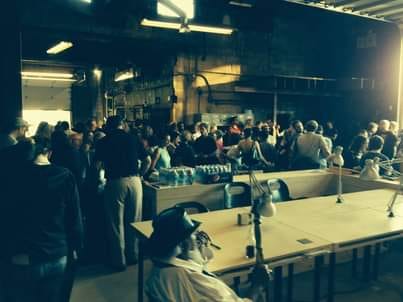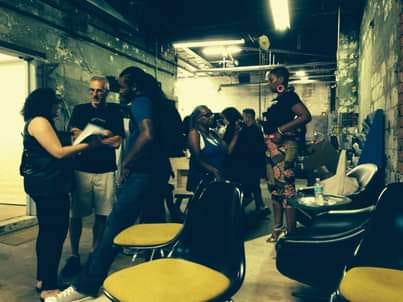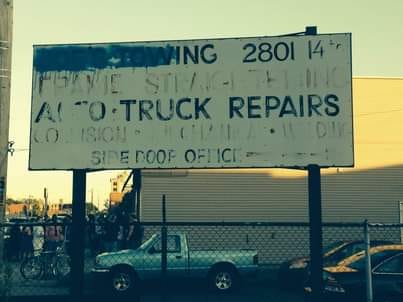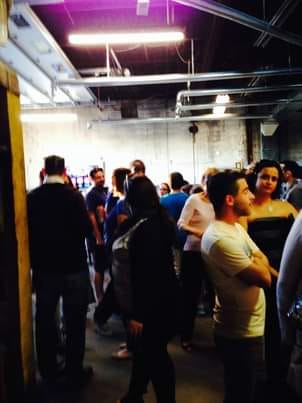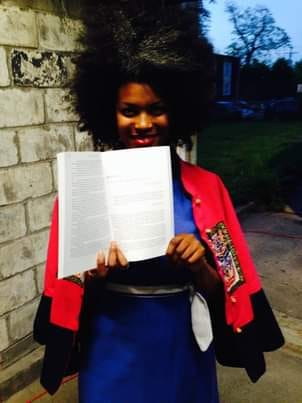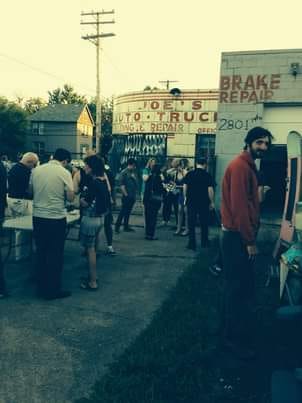Facebook served me a memory that other day. I hate Facebook, and their memories, and I hate myself for using the verb “serve” just there to describe algorithmic nostalgia.
I clicked.
It was the eighth anniversary of the launch party for A Detroit Anthology.
A Detroit Anthology was the second book I published. The “press,” such as it was, was called Rust Belt Chic Press. The book was edited by Anna Clark, whom I had known for years already, as she had interviewed me about my first book, A Skeptic’s Guide To Writers’ Houses, years earlier. A freelancer based in Detroit, Anna had written for pieces for Belt Magazine, which I was then running. When I decided to continue the work I had done with Rust Belt Chic: The Cleveland Anthology and publish a similar anthology about Detroit, I reached out to Anna.
Anna spent a year compiling an exceedingly impressive list of contributors. No offense to any of the other anthology editors in this now 24 book series, but no one has hustled like Anna hustled, crawling through the city—all parts of the city—to find its best storytellers. She corralled over 60 writers, from famous to first time, and edited each piece with compassion and expertise.
Then she Anna organized the launch party. It was, the photos remind me, the Platonic ideal of a Belt launch party, the encapsulation of what we were trying to do, and be (and now, with perspective, succeeded in doing). The party was held in an old auto shop that was trying to become a co-working space on a block otherwise filled with empty lots. It was June, and the grass was high, giving us those hints of wilderness surrounding rotten civilization—you know, that an old tire poetically encircling a field of dandelions, the whole ruin porn thing.
Inside the body shop/proto-WeWork it was dark, dank, cool. Open spaces inside brick walls. A few handmade benches I think; a few tables. Lighting was provided by large garage bays opened to the driveway. With help from her parents, who drove in for the event, Anna brought coolers and coolers of beer. She somehow managed to include a mobile massages, who set up a station to set up on the sidewalk. She arranged for a food truck. I drove up from Cleveland with six cartons of books in my trunk, and set up a table to sell them by the front entrance.
Whenever the start time was—ten minutes earlier, actually—people started streaming in. So many people. A line quickly formed behind my table. I fumbled with the iPhone doohickey that took credit cards. Everyone wanted a copy. Most wanted copies. Eight copies for the mother of one of the poets. Four copies for the first-time published essayist. . Aaron Foley, who had written the lead essay in the book, introduced himself to me early in the night, and someone—I don’t remember who— just came up next to me and helped me handle the crowd, and sell the books, to keep the line moving forward. I asked some people, who were neither contributors nor friends and family, how they found out about the event: for many, it was the two page spread that had run in the Free Press a few days earlier.
At least one hundred people came. We sold two hundred books (I ran out). During the readings, the crowd was anything but silent, cheering in the middle of essays when the writer mentioned a familiar school or street, calling and responding when another read a poem. It was, in all its connotations, a scene.
A Detroit Anthology would go on to sell over 4,000 copies that year, a feat that becomes only more impressive the longer I stay in the publishing game. So too is that two-page spread in the local newspaper, now that such coverage is even scarcer. So too that so many people read the local newspaper.
Eight years is long enough for memories to become history. Launch parties in old auto parts shops are still something Belt might do, but we would probably be more self-conscious about it (“So authentic, huh? Very Rust Belt lol”). The felt sense that a city was going through something —whatever that something might be—rejuvenation, failure to rejuvenate, a cultural moment, losing its roots—is now much, much harder to grasp. Not that the cities themselves have changed much. You won’t many statistics that show much of a difference in population growth, demographics, inequality, racism. But the narratives have changed, and are now more defuse, and narratives about cities is what were trafficking in.
Or maybe it’s me. I’ve changed; my relationship to publishing books has changed; my relationship to Rust Belt cities has changed. Years will do that to you, whatever happens during them. Of course, in 2016 we saw the rise of the “Rust Belt” as a complicated and mostly misleading signifier of a menu of new concepts: “the real America,” the beleaguered blue collar guy; the sad, lost, fetid leftovers of twisted ideology; of resentment; of, when it comes down to it, whiteness, and masculinity. J.D. Vance is the Trump-endorsed GOP candidate for Senate in Ohio; how would we have parsed that in 2014? The launch party for A Detroit Anthology was neither primarily white nor mostly male. If it was glued together by anything one concept, it was that sweet, poetic moment when depression shifts slightly to throw out shards of hope, generative ideas only possible because they are also, literally and emotionally, born of loss.
This launch party was a moment; now we can recollect in tranquility, served by an algorithm. A project aimed at capturing one specific place during one particular time is at now once a period piece, grist for future historians, and, tragically and perfectly, still true. Books! There’s a magic there.
Anna’s next book was an award-winning investigator into the Flint water crisis. These days, she’s a staff writer at ProPublica. Aaron Foley, who wrote that initial essay, has since published three (!) books with Belt. His latest is in part about the “new Detroit,” and what how an influx of white folks from other places and some not-terrible-economicallly years have changed the city; it would have been unintelligible in 2014. Our next city anthology, publishing later this month, is about Baltimore, and the launch party will be at a library. I won’t be able to go to this one, which makes me sad (I’ve done my best to attend as many of these as I could).
I wonder if we should go back to Detroit, to see if we can capture it again. I wonder what would be the most appropriate place for a launch party a decade later. I wonder which media would cover it. I wonder where people would go to share their photos of the party, and where we would go, years later. to find our memory.
Not yet a subscriber? Take 50% off the annual fee (just twenty bucks!) through the end of June.
I’m teaching TWO online courses on non-fiction book proposals in July. One is less expensive than the other. Check them out! Sign up or email questions to me at anne.trubek@gmail.com. I’m also open for developmental editing over the summer.
Notes from a Small Press is the newsletter by Anne Trubek, the founder and owner of Belt Publishing. Subscribe to receive every post, and not just free ones like this. Oh and don’t forget to grab a SIGNED copy of So You Want to Publish a Book?, the book based on this newsletter that other people say good things about.
